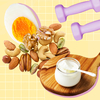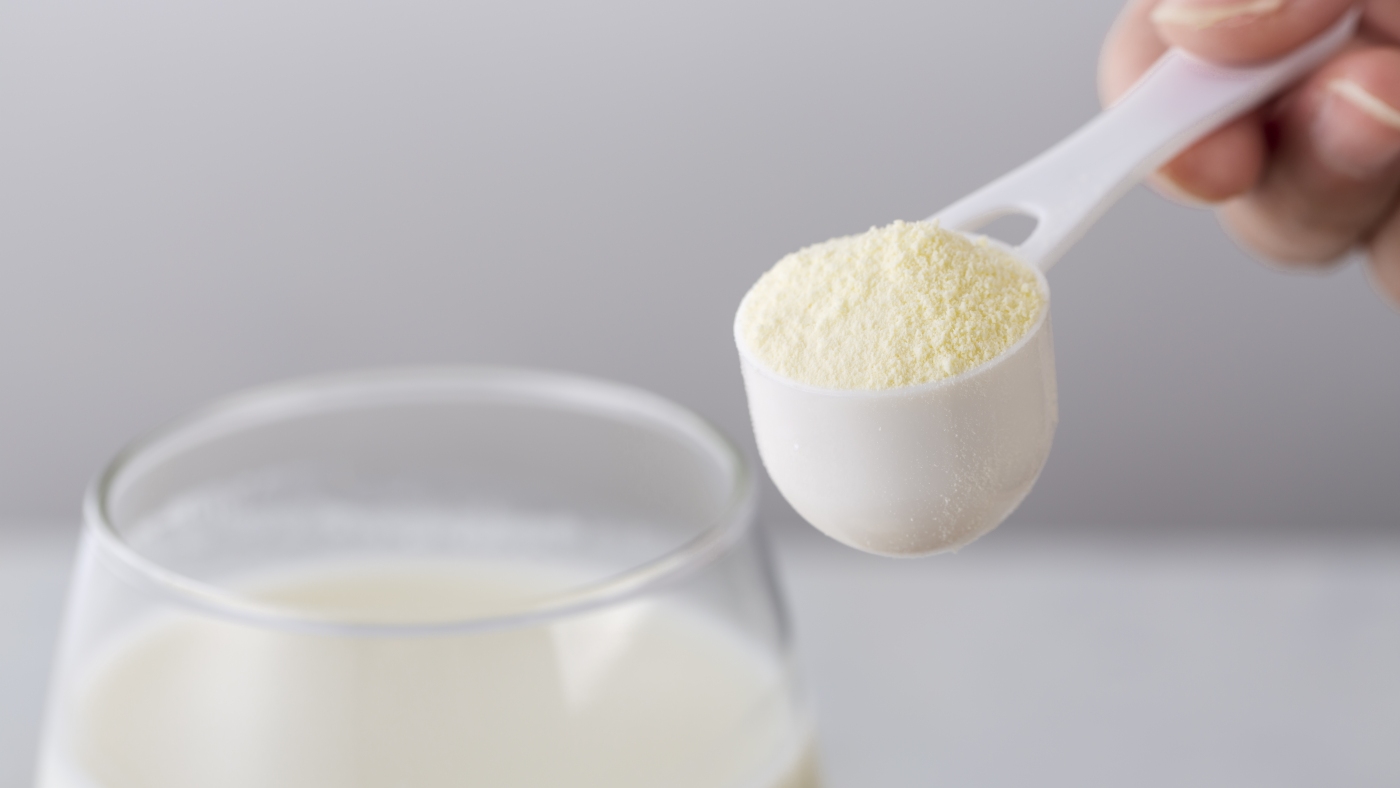
A ballot of oldsters final fall discovered 40% of teenagers consumed some kind of protein complement prior to now 12 months. Boys took it to bulk up; women took it to switch meals.
Huizeng Hu/Second RF/Getty Photographs
cover caption
toggle caption
Huizeng Hu/Second RF/Getty Photographs
Emiliano Slesaransky, 17, joined Santa Monica Excessive College’s soccer staff as a freshman and — on the urging of coaches and teammates— began hitting the health club each time attainable: within the morning, after faculty, and on the weekends. The folks he met there would share their methods for bulking up.
“They’d take protein powders, different dietary supplements like some folks I do know take ashwagandha, and possibly creatine,” he says, citing common vitality and exercise-enhancing dietary supplements. Emiliano began taking a few of them, too.
However his dad, Eduardo Slesaransky, wished to verify his son’s weight-reduction plan — and angle — remained balanced: “My concern was the affect that social media has on these dietary supplements and these sorts of issues and the tradition of physique constructing and the gyms.”

Protein dietary supplements are massive on social media, the place influencers are serving to drive gross sales of protein bars, shakes and powders. A ballot of oldsters by the Mott Youngsters’s Hospital on the College of Michigan final fall discovered 40% of teenagers consumed some kind of protein complement prior to now 12 months.
“Teen boys have been extra probably — twice as probably — to devour protein day-after-day,” says Sarah Clarka analysis scientist and co-director of the ballot.
Ladies, she says, extra usually relied on dietary supplements as meal replacements, and the inspiration to devour protein shakes, bars or powders usually got here from coaches, friends, or influencers on social media. However Clark says mother and father have been additionally amongst these selling protein to their kids.
“I’m wondering if, as mother and father, we’re recognizing how a lot messaging we’ve taken in about protein being good,” she says. “Now we have absorbed this messaging: That is the important thing to being wholesome,” she says, when in actual fact it is just one think about a balanced, nutritious diet.

The overwhelming majority of teenagers already get sufficient protein of their weight-reduction plan with out dietary supplements, pediatric dietician Abriana Cain says.
Elkhophoto/iStockphoto/Getty Photographs
cover caption
toggle caption
Elkhophoto/iStockphoto/Getty Photographs
How a lot is sufficient?
There’s additionally such a factor as an excessive amount of protein, says Abriana Cain, a pediatric dietician with Youngsters’s Nationwide Hospital in Washington, D.C. As a basic rule, Cain tells teenagers and oldsters to gauge protein consumption primarily based on dimension — benchmarked at roughly 1 gram of protein a day per kilogram of physique weight. (For a 150-pound teen, that quantities to about 68 grams of protein per day — or the tough equal of a cup of cooked hen, a cup of yogurt, and a cup of black beans.)

“It’d even enhance from there, primarily based on their bodily exercise wants,” she says.
Cain says greater than 100 grams a day can harm the kidney and liver in the long term. It might probably additionally trigger abdomen ache, because it did for considered one of her sufferers. “They have been consuming protein dietary supplements with all of their meals and likewise with all of their snacks, and so they have been having a whole lot of stomach ache.”
The overwhelming majority of teenagers, Cain says, already get sufficient protein of their weight-reduction plan with out dietary supplements.
There are additionally considerations in regards to the advertising of dietary supplements.
There isn’t a high quality management for these merchandise, notes pediatrician and consuming dysfunction professional Dr. Jason Nagataon the College of California San Francisco. Dietary supplements, together with protein bars and powders, are not regulated by the Meals and Drug Administration — so they don’t seem to be examined, and their substances aren’t verified.
“I feel it is necessary for teenagers and oldsters to know that there is not that type of rigorous high quality management, particularly if you’re getting mixtures of muscle constructing dietary supplements and merchandise,” he says. “I’d simply be very cautious.”
Nagata advises researching, studying ingredient labels and shopping for instantly from identified corporations. Some merchandise have been discovered to have contaminants similar to heavy metals, micro organism, or chemical compounds or adulterants not listed on the label.
Consuming issues are up
Individually, Nagata is worried that the protein craze is contributing to the alarming enhance in consuming issues amongst boys over the previous twenty years, worldwide. He observes that over that point interval, motion figures like Batman and Superman are bought with larger muscle mass, and pressures on extraordinary youngsters to submit engaging photographs of themselves to be common on-line have elevated.
“The masculine physique superb has change into more and more giant and muscular, and so an increasing number of boys try to change into muscular now than they’ve ever earlier than,” he says.
Emiliano Slesaransky stopped utilizing protein powders a couple of 12 months in the past, he says, largely as a result of he began forgetting to take it.
His father, Eduardo, says his son nonetheless seems to be very sturdy and match, however is now not fixated with bulking up for sports activities. “He is specializing in moving into faculty.”

